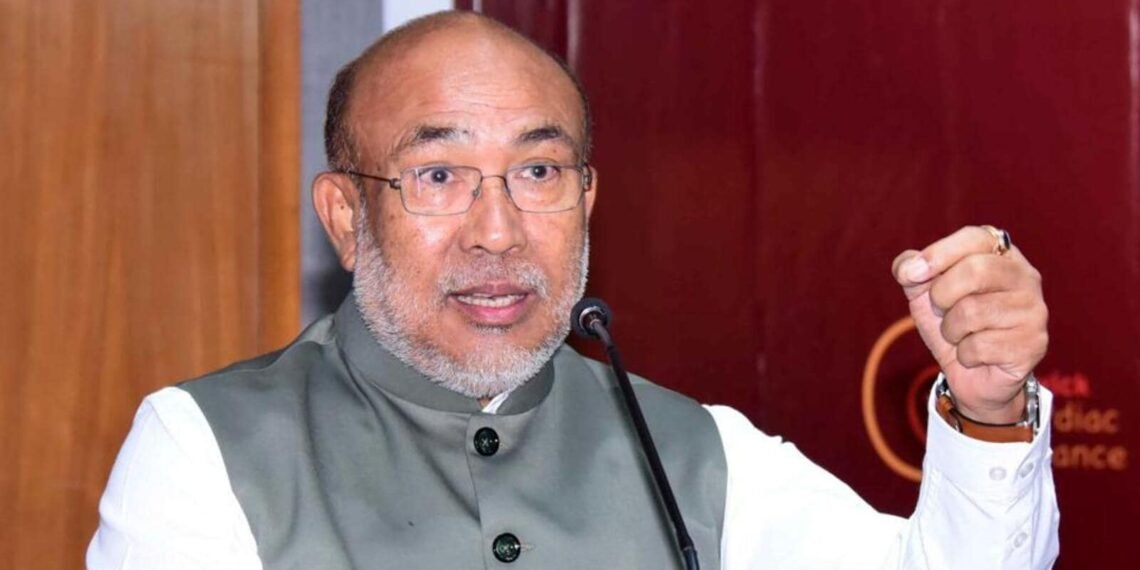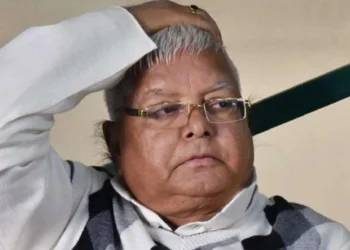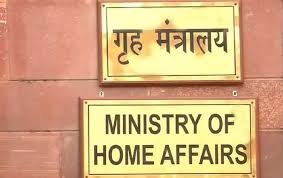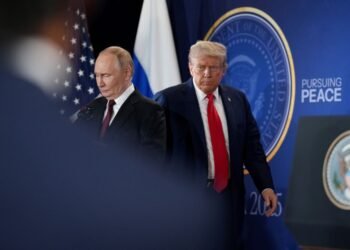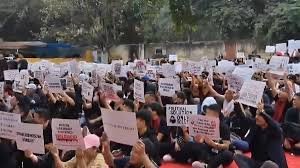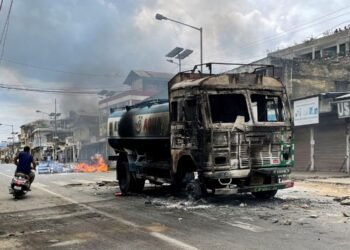With armed groups still active and communal trust shattered, observers say reinstating political rule in Manipur now could reignite tensions across the state.
BY Navin Upadhyay
June 28, 2025 – Former Manipur Chief Minister N. Biren Singh reignited the debate over restoring an elected government in the state during a press conference held earlier today at the BJP Manipur Pradesh headquarters. The event was organized on the sidelines of a commemoration marking 50 years since the Emergency.
Singh expressed confidence that the BJP, along with its National Democratic Alliance (NDA) partners, would soon form the government in Manipur. He claimed the backing of 44 MLAs in the 60-member state assembly.
“We are not fighting any political party. Our only aim is to end the crisis and bring peace to the state,” Singh told reporters after attending a party meeting at Thambal Sanglen in Imphal, chaired by state BJP president A. Sarda Devi.
Singh asserted that law and order had improved significantly in recent months, noting that there had been no reported gunfights in the past eight or nine months. He praised Union Home Minister Amit Shah for “working day and night” to restore normalcy and lauded his leadership during the crisis.
Singh’s claim notwithstanding, Manipur’s fragile security environment, deep-rooted ethnic divisions, and the ongoing threat posed by armed militant groups make the state unfit for the immediate restoration of democratic governance. Objective observers of the situation argue that President’s Rule—imposed on February 13, 2025—must continue until significant progress is made in disarming militant factions and building a foundation for lasting peace.
READ: Investigation: ₹11 Lakh, Pig Sacrifices, and Silence — A Truth Laid to Rest in Manipur’s Graveyards
Leaders like Singh who are calling for the restoration of an elected government in Manipur under President’s Rule are turning a blind eye to the grim realities on the ground. The ethnic divide remains dangerously deep, with hostility so severe that even an accidental crossing of the buffer zone can result in death. Dozens of people have been abducted and never returned. The state sits on a powder keg—one spark away from another explosion of violence. The Kuki-Zo community remains firm: they demand nothing short of self-administration under Union Territory status. Reinstating a popular government without first addressing these harsh truths might temporarily postpone the crisis, but it will not resolve it. Left unresolved, the tensions are bound to erupt into an even greater catastrophe.
It is one thing to sermonize about the virtues of democracy—but what Manipur witnessed was not democracy. It was brutal majoritarianism, where arms were looted with impunity and over 250 people were killed, raped, or displaced—with no justice delivered. How does Biren Singh expect people to trust the state machinery when notorious figures like Arambai Tenggol leader Korounganba Khuman remain free, despite serious charges filed by the NIA?
In fact, these very elements are feeling the heat under President’s Rule and are now relying on their political patrons to push for its removal—so they can return to running the state just as they did in the past. Home minister Amit Shah must look into this aspect before taking call on restoring the state government.
In this backdrop, extending President’s Rule is not just necessary—it is imperative. Trust must be rebuilt, and law and order must be restored before handing Manipur back to the political class that presided over the horrors of May 3, 2023.
Persistent Threat of Armed Militias
Manipur’s ethnic conflict, which erupted in May 2023, has been fueled by the proliferation of armed groups, including Meitei militias like Arambai Tenggol and Kuki-Zo militant outfits. Over 6,000 firearms and 600,000 rounds of ammunition, including sophisticated weapons like AK-47s, mortars, and grenades, were looted from police armories during the violence. At least two thirds of these weapons remain unrecovered, enabling militias to maintain a stranglehold over parts of the state. The arrest of Arambai Tenggol leader Kanan Singh and four associates on June 7, 2025, sparked unprecedented protests and fresh tensions, highlighting the militia’s influence and the volatility of the situation.
“We are working to form a Govt at earliest.
After looking into ground situation, I have faith that a government will be formed soon.
BJP and its allies want a popular Govt as well. We are working for restoration of popular govt.”
– Ex Manipur CM N Biren Singh pic.twitter.com/JHJuRDoStl
— News Arena India (@NewsArenaIndia) June 28, 2025
Disarming these groups is critical to restoring stability, but progress has been slow. The presence of looted arms, combined with cross-border insurgent networks linked to Myanmar, fuels a cycle of violence. It’s well know that in Manipur, the nexus between politicians and armed groups run deep, and the gins playa key role in the polls. So, it would be unwise to think that if the popular government was put in place, the leaders would make any effort to defang the militant group, which run well-organised extortion and abduction rackets. The state may spiral into a longer and more dangerous phase of communal separation” if disarmament is not prioritized.
READ: Court Filing Reveals Even USA’s Long Arms Can’t Touch Adani
A BJP-led government, particularly under Singh’s leadership, risks being perceived as partisan, given allegations of his administration’s tacit support for Meitei militias like Arambai Tenggol and Meitei Leepun. Restoring a popular government without neutralizing these armed groups could embolden militias, undermine law enforcement, and escalate violence, making President’s rule essential for coordinating centralized disarmament efforts.
Deep Ethnic Polarization
The ethnic divide between the Meitei majority in the Imphal Valley and the Kuki-Zo communities in the hill districts remains a significant barrier to political restoration. The 2023 violence, triggered by a Manipur High Court order recommending Scheduled Tribe (ST) status for Meiteis, has led to over 260 deaths and displaced 60,000 people. The state is now “fragmented along permanent ethnic lines, with Meiteis and Kuki-Zo living in segregated zones separated by security force-patrolled buffers. The Kuki-Zo demand for a separate administration, supported by all 10 Kuki-Zo MLAs, including BJP members, reflects a profound distrust of Meitei-dominated governance.
READ: RSS Preamble Row Risks Backlash in Poll-Bound Bihar
Singh’s tenure as Chief Minister exacerbated these tensions. His policies, such as eviction drives in Kuki-Zo-dominated hill districts and the withdrawal from Suspension of Operation agreements with Kuki militant groups in March 2023, were perceived as anti-tribal. Allegations of his administration’s complicity in violence against Kuki-Zo communities, including audio tapes submitted to the Supreme Court purportedly showing Singh colluding in attacks on Kuki villages, have further eroded trust. Restoring a BJP-led government either under Singh or a similar Meitei leader risk reigniting ethnic tensions.
Internal BJP Dissent and Political Instability
Singh’s push for a BJP-led government overlooks internal challenges within the party. The rebellions against Singh’s leadership in the past, reflect significant factionalism. The BJP’s inability to agree on a new Chief Minister after Singh’s resignation in February 2025 led to the imposition of President’s rule, as no consensus candidate emerged. Restoring a BJP-led government amid such disunity risks further political instability. The National People’s Party (NPP), a former ally, withdrew support in November 2024 over Singh’s handling of the violence but rejoined the NDA after his resignation, indicating conditional support. A premature return to a BJP-led government could deepen factionalism, weaken governance, and distract from addressing the root causes of the crisis. President’s rule allows the central government to stabilize the political landscape and mediate between factions, ensuring a more cohesive administration when elections are eventually held.
Cross-Border Challenges and Systemic Issues
Singh’s press conference highlighted illegal immigration and drug cartels as major threats may not be entirely untrue. Several Myanmar-based insurgent groups exploit Manipur’s porous border, fueling arms and drug trafficking. But Singh’s own track record in tackling these issues were pathetic when he ruled the state with absolute majority.
President’s rule enables centralized coordination with agencies like the National Investigation Agency (NIA) and Assam Rifles to tackle cross-border threats. The central government’s deployment of over 5,000 additional Central Armed Police Forces personnel in November 2024 has helped curb violence, but issues like drug trafficking and illegal immigration require sustained, impartial efforts. A BJP-led government, constrained by local political pressures, may prioritize electoral gains over long-term security measures, but thy should realise that the President’s rule was a more effective framework for addressing these challenges.
While Singh claimed the absence of fresh clashes in recent months, periodic violent protests persist, as seen in recent incidents in Kangpokpi, Imphal, Churachandpur. Over 60,000 people remain displaced, living in relief camps, and highways face intermittent blockades. Restoring a popular government without addressing these issues risks derailing fragile gains.
Under Article 356, President’s rule can be extended after six months, if justified. With Manipur approaching six months on August 13, 2025, the ongoing security and governance challenges warrant an extension.
Biren Singh’s optimism about forming a BJP-led government overlooks the stark realities of Manipur’s crisis. The proliferation of armed militias, deep ethnic polarization, internal BJP dissent, and cross-border threats demand a centralized, impartial approach that President’s rule is better equipped to provide. Until militant groups are disarmed and meaningful reconciliation is achieved, President’s rule remains the most viable path to stabilize Manipur and prevent further violence.



